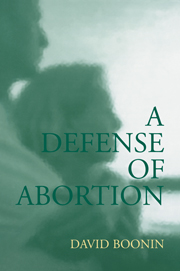3 - Postconception Criteria
Published online by Cambridge University Press: 05 June 2012
Summary
OVERVIEW
In Chapter 2, I considered a number of arguments in defense of the claim that the typical human fetus acquires a right to life at the moment of its conception, and argued that none of them are successful on the abortion critic's own terms. Critics of abortion have failed to provide a good reason to believe that a zygote has a right to life. But I am assuming, at least for the sake of the argument, that you and I do have such a right, and that we developed gradually from such zygotes. So if we did not acquire this right at the moment of our conception, there must be some point after conception at which we did. The question that remains, then, is: When is that? This question is crucial to assessing the rights-based argument against abortion, understood as an argument for the thesis that abortion, at least in typical cases, is morally impermissible. Approximately one half of all abortions take place within the first nine weeks of gestation, approximately 90 percent within the first trimester, and virtually all by the twentieth week of gestation. If the fetus acquires a right to life after conception but within the first several weeks of gestation, then abortion in typical cases does involve the death of an individual with the same right to life as you or I even if the conception criterion is mistaken.
- Type
- Chapter
- Information
- A Defense of Abortion , pp. 91 - 132Publisher: Cambridge University PressPrint publication year: 2002



